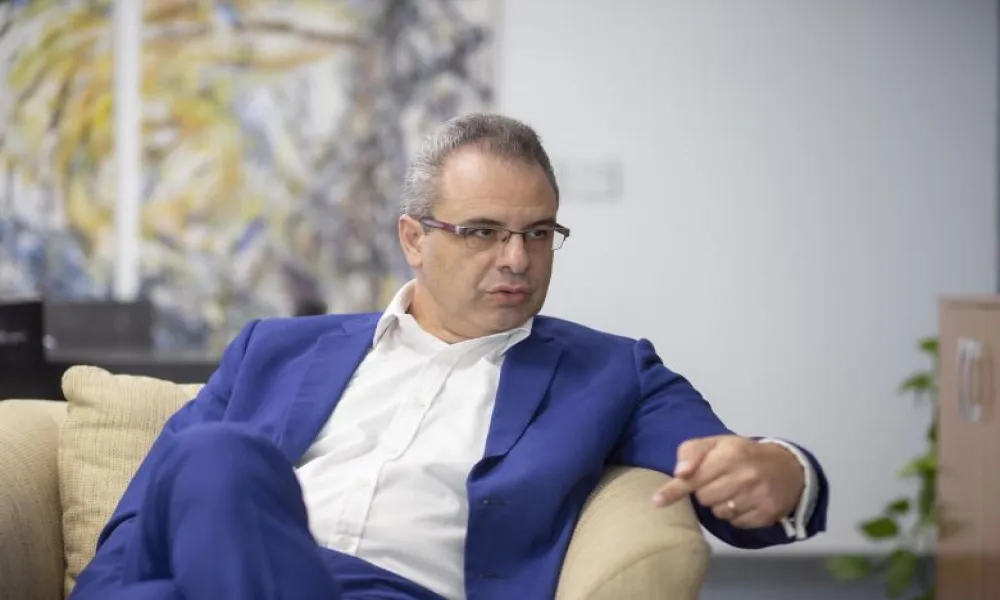Greek Cypriot negotiator Menelaos Menelaou hopes renewed movement on the Cyprus problem brings about ‘substantive’ steps towards a resumption of talks, but does not see setting a timetable for talks in a positive light, given past experience.
Following the announcement of the first in-person leaders’ meeting scheduled for this Thursday at the UN Protected Area in Nicosia, Menelaou spoke to Politis Radio 107.6 & 97.6 on Monday about what to expect.
He described the upcoming first meeting of President Nikos Christodoulides and new Turkish Cypriot leader Tufan Erhürman as an opportunity for the two leaders to exchange views and prepare the ground for an enlarged meeting that could open the path for a resumption of peace talks under the UN framework.
Menelaou said the last enlarged ‘5+1’ meeting in July – held under the UN Secretary-General’s auspices in the presence of the two sides and three guarantor powers – concluded that another expanded meeting would be held by the end of the year.
“We continue to operate on the basis of that decision. Now, what of course must precede is the necessary preparatory work,” he said.
Tete-a-tete
First, the two leaders will sound each other out in a tete-a-tete on Thursday morning. The UN Special Representative to Cyprus Khassim Diagne will host the meeting at his official residence but will not take part, leaving them to discuss amongst themselves and possibly their aides.
Menelaou said the negotiators will be present, but Erhürman has yet to appoint one. Without a formal negotiation process for eight years now, successive Turkish Cypriot leaders have said they find no reason to justify appointing a negotiator. In the meantime, Erhürman’s recently appointed ‘undersecretary’ Mehmet Dana will accompany him to the talks with Christodoulides.
Mapping out the period ahead, Menelaou told Politis that the leaders’ meeting will be followed by a visit of the UNSG’s Personal Envoy María Ángela Holguín in early December, to prepare the ground for the next ‘5+1’ expanded meeting under UN auspices.
Decisions on substance
The negotiator highlighted the importance of taking steps on ‘substance’ in the coming period, noting that previous efforts to move towards a resumption of peace talks failed due to the Turkish side’s positions being outside the agreed framework, a clear reference to the two-state policy adopted by Erhürman’s predecessor Ersin Tatar and Ankara.
As such, Menelaou said the next enlarged meeting including the guarantor powers would be “a moment of reckoning regarding the intentions, political will, and positions of all those involved”.
No to timeframes
Asked if the two leaders will set a timetable for the talks process on Thursday – an apparent condition of the talks set by Erhürman in his pre-election campaign – Menelaou appeared to reject the idea. He noted that, due to past experience, as in the timeframe set during the Annan Plan period, it was “a very sensitive matter […] that didn’t work in the most constructive and productive way.”
Instead, the negotiator wanted to focus on the philosophy of continuing on the basis of “a sequence of successive steps”, adding that the next phase must include “steps forward, mainly on substance, not only on confidence-building matters”.
Where the sides left off
The aim is to start a negotiation process within the agreed framework, safeguarding the “extremely important” body of work in Crans-Montana, he said. Menelaou called for patience and persistence, noting that should talks resume, the road ahead would not be smooth.
“But the ultimate aim will be for the effort to reach a level of maturity that will allow us, this time, to achieve a comprehensive agreement.”
Asked to comment on the debate about where exactly the sides left off at Crans-Montana, the Greek Cypriot negotiator said this was clear.
“It is clear and absolutely evident that when we speak of the Crans-Montana body of work, we refer to the framework and basis of the solution as agreed and as adopted by the United Nations and by the entire international community; that is, the UN-prescribed basis for the Cyprus solution: a single state, single sovereignty, single international legal personality, single citizenship.
“Beyond that, there are the recorded convergences; the outstanding issues on which efforts must focus. There are the Secretary-General’s six points – an overall approach which involves all the aspects that must comprise a comprehensive Cyprus settlement, they must be safeguarded. It is of critical importance to safeguard them and move forward to cover the remaining ground.”
Technical committees active
On the work of the 13 bicommunal technical committees, Menelaou said it remained to be seen whether the new Turkish Cypriot leader would replace any of the members of the committees. All were currently active, he noted, though there was scope for some to be even more productive. The effort, looking ahead, will be to give “additional impetus where there is even greater scope for producing results,” he added.
